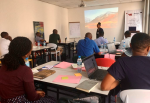 How can their organisational context best support those who implement ICT4D projects?
How can their organisational context best support those who implement ICT4D projects?
People – designers, builders, operators, champions – are critical to the successful implementation of ICT4D projects. The digital development organisations that employ these practitioners already know that. But what they know far less about is how to create a supportive organisational context that will improve ICT4D practitioner performance and, hence, ICT4D project success rates.
I have therefore been undertaking field research in East Africa designed to tease out components of supportive context, based on interviews in five organisations which were a mix of NGOs and social enterprises. To date, I have identified six “habits of highly-effective digital development organisations”:
1. Reinforcing Mission Congruence
The most-effective contexts were those in which ICT4D practitioners were given a clear sense of how their work fitted with the organisation’s wider mission, which typically related to social impact. As well as giving practitioners the bigger picture of their contribution, this also helped create a unity of purpose with shared goals of making a difference.
2. Strong Non-Monetary Rewards
Money is tight in most digital development organisations but they can successfully motivate their practitioners with non-monetary rewards. Flexibility on working hours and opportunities for work-life balance came up repeatedly in this category, alongside recognition from peers of one’s contribution.
3. Involvement in Monetary Reward-Setting
A role for non-monetary rewards does not mean money is unimportant – it is! But just as important as the amount was the process by which pay was calculated. Supportive contexts were those where pay was transparently calculated and openly discussed, and hence where ICT4D practitioners felt involved in the process of decision-making.
4. Support for Career Progression
To make their best contribution to ICT4D projects, practitioners needed to feel that they were making progress in their careers. Though often backed by direct mentoring, organisational support here varied by career stage. Early-career practitioners had a strong perceived need for skills development: not narrow task-specific skills but a broad and hybrid mix of technical and non-technical capabilities. This worked best where their organisation offered them a mix of different roles but also ensured access to high-quality digital tools and infrastructure. Mid-career professionals also wanted growth opportunities but they focused less on technical skills and more on being given the autonomy and responsibility to develop leadership capabilities.
5. Meeting Personal Goals
ICT4D practitioners give their best to their projects and their organisation when they have a perception of reciprocation; particularly in terms of being helped to achieve their personal goals. Goals of social impact and skills-building for career progression were mentioned already, but supportive contexts could provide other things – networks of stakeholder relations to build social capital for the future, and facilitation of personal development projects.
6. Socio-Emotional Support
ICT4D often has a technical bias but practitioners worked best in cultures attuned to the human side of work, and in which they felt their whole selves were recognised. These were organisations that were more like “families” than “well-oiled machines”; in which peers and managers cared about wellbeing and would take time to listen and engage with personal problems; and in which socialisation and hence a sense of belonging were actively encouraged.
These findings may themselves have some specificity to East African digital development organisations. Each organisation may thus need to identify the dimensions of organisational support that will work with its particular ICT4D practitioners. Nonetheless, these six habits should be a useful starting point for all organisations.
If you would like further details about the six habits, or my ongoing work using these to develop interventions for digital development organisations, then feel free to contact me: epiphania.kimaro[@]manchester.ac.uk
Photo credit: Gladness Mayenga